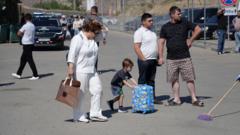Reports from the Agarak border crossing reveal an influx of Iranians fleeing the ongoing conflict with Israel, with many expressing their fears amid persistent violence.
Iranians Flee to Armenia Amid Escalating Conflict with Israel

Iranians Flee to Armenia Amid Escalating Conflict with Israel
As the conflict between Israel and Iran escalates, many Iranians are crossing into Armenia seeking safety from the violence.
At the Agarak border crossing between Armenia and Iran, a stark landscape of dry, rocky mountains provides a harsh backdrop for those seeking refuge from the escalating conflict between Israel and Iran. Despite the inhospitable environment, many have made the arduous journey, fearing for their safety in a region now fraught with danger.
Among the travelers is a woman juggling her infant while her husband haggles with taxi drivers. Further along, a family reunited after traveling from Austria adds to the crowd. Most crossing into Armenia bear residency or citizenship from countries outside of Iran, often citing the ongoing conflict as their reason for departure.
The conflict erupted on June 13 when Israel launched airstrikes targeting military and nuclear sites in Iran, which resulted in casualties, including the reported deaths of at least 657 people. Iran has retaliated, resulting in more casualties in Israel as the situation deteriorates. As Israel has established air superiority over Tehran, residents of the city face a constante barrage of attacks—overwhelmingly reported as causing deep distress and fear.
Traveling to Armenia from Tehran traditionally requires around 12 hours, but the psychological toll of the warfare seems to weigh heavier than the distance itself. Numerous individuals voiced their traumatic experiences, mentioning the distress of nightly explosions that interrupted any hope for restful sleep. One young Afghan man, who escaped Iran with little more than a suitcase, shared, "Every night is like attacking... the situation is not good at all."
Interestingly, some travelers seemed less inclined to flee, including Ali Ansaye, who had holidayed in Armenia but was heading back to Tehran without fear. He expressed his defiance against Israel's aggression, questioning its legitimacy and proclaiming that he would rather face threats in his homeland.
Despite differing perceptions among the fleeing Iranians, a general sentiment of fear and urgency permeates this latest exodus, as citizens grapple with the emotional and physical repercussions of a conflict that disrupts their lives and futures. As they embark on their journeys toward safety, the landscape of the Middle East remains perilous, and the hope for peace feels increasingly remote.





















